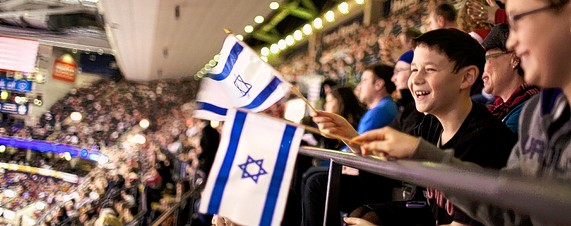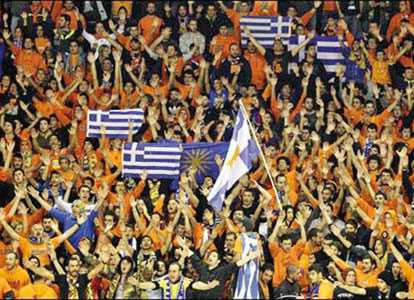By JOEL MILLMAN
![NBA Game Promises to Be a Turkey? Call In the Turks—or the Filipinos 2 [Heritage]](http://si.wsj.net/public/resources/images/P1-AZ095_Herita_F_20110118182708.jpg) Donald Weber for The Wall Street Journal HERITAGEToronto fans turned out for Jewish Heritage day featuring the Sacramento Kings’ Israel-born Omri Casspi.
Donald Weber for The Wall Street Journal HERITAGEToronto fans turned out for Jewish Heritage day featuring the Sacramento Kings’ Israel-born Omri Casspi.
LOS ANGELES—Salih Eroglu prepared carefully for the Los Angeles Clippers’ big day-after-Christmas basketball game.
The 33-year-old gathered Turkish baklava pastries, sparkling “evil eye” pendants and sunflower seed snack packs. He ordered 1,000 red “Turkiye” baseball caps and 1,000 T-shirts emblazoned with images of Hedo Turkoglu, Istanbul-born forward of the visiting team, the Phoenix Suns.
On hand, too, were Turkish dancing girls, a Turkish pop star to sing “The Star-Spangled Banner” and raffle stubs for an airline ticket to Istanbul. In short, Mr. Eroglu had everything for a successful Turkish heritage event—an occasion meant to boost attendance for the Clippers, one of the National Basketball Association’s worst-drawing teams.
“We were really, really ready,” says Mr. Eroglu, an engineer who organizes the annual Turkish event.

Across the NBA, teams with losing records like the L.A. Clippers are turning to events like Turkish Heritage night to fill seats. WSJ’s Joel Millman reports.
Except for one thing. Just before the event, Phoenix sent the Turkish fans’ favorite Sun—the 31-year-old Mr. Turkoglu—to the Orlando Magic. The move left hundreds of ticket holders without a countryman to root for.
It’s that time of year in the NBA: the deep winter slog when teams with losing records search far and wide for gimmicks to fill seats. That’s why many teams are drumming up “Heritage” events, meant to court even the smallest émigré enclaves to NBA courts, and provide just a tad of buzz—and a souvenir trinket or two—to pump up attendance.
![NBA Game Promises to Be a Turkey? Call In the Turks—or the Filipinos 4 [HERITAGE]](http://sg.wsj.net/public/resources/images/HC-GP510_Ero287_BV_20110118215202.gif) Salih Eroglu
Salih Eroglu
The Toronto Raptors have Filipino Night set for early next month, arriving on the heels of Serbian, Jewish and Chinese nights in January.
The Minnesota Timberwolves are hosting both an Israeli Heritage and a Jewish Heritage event, with a Canadian Heritage Night teed up for late January and a German Heritage night for March.
The Golden State Warriors’ Latino Night is on Jan. 28, after the team held events saluting fans from Iran and China.
Heritage events became popular in the U.S. about a decade ago, when the NBA began signing more talent from overseas. Currently, there are 86 foreign-born players in the NBA.
Pitching ethnicity is an easy win for clubs that don’t typically draw big crowds. With 41 games on a team’s home schedule, most won’t sell out. Weak opposing teams can further dash hopes for a strong turnout. But by focusing on visiting ethnic players, heritage events can generate interest, raising the odds of higher ticket sales. With the right plans—such as special foods and autograph signings with the star player—some teams say they can fill as many as 2,000 additional seats.
But heritage events can be tricky. Many NBA rosters aren’t intact long enough to justify an ethnic night based on a particular athlete—thus, for example, creating Turkish events without a Turkish player.
Still, many teams continue with their heritage proceedings even without the ethnic player slated to showcase the event. “1,300 tickets, and counting,” exulted Toronto Raptors’ media director Jim LaBumbard in anticipation of a Jan. 14 Serbian event arranged to show off Raptors player Peja Stojakovic. This, despite Mr. Stojakovic’s absence from the roster since late November due to a knee injury.
The biggest heritage star this season is 6-foot-9 Omri Casspi, Israel’s lone NBA representative, who plays small forward for the Sacramento Kings. Despite having one of the NBA’s worst records, the Kings are a touring sensation this year, packing arenas with Jewish fans eager to greet the lanky Israeli.
“I meet a lot of kids who get tickets to a Kings game as a bar mitzvah present,” says the 22-year-old Mr. Casspi, who adds he’s also fielded several offers of marriage as he tours NBA arenas.
This month, Mr. Casspi’s Kings lured Jewish fans in Toronto, Washington, Boston and Atlanta. Fans at the Washington Wizards game got Wizards yarmulkes in conjunction with Mr. Casspi’s appearance last week. Organizers at the Atlanta and Boston games provided kosher foods at concession stands.
While a pre- or post-game opportunity to meet with players like Mr. Casspi drives ticket sales, there’s no guarantee that players will oblige. “He’s done more than his share,” says Troy Hanson, the Kings’ spokesman. “We just had to say no to some teams.”
Some NBA teams have found a safer bet is to showcase others, such as ethnic coaches and retired players—thus eliminating any risk of a celebrity no-show. Raymond Townsend, who last played in the NBA in 1981, has been making a comeback of sorts hosting Filipino Heritage events across the NBA.
“When I played, people thought I was just one of the lighter-skinned NBA players with an Afro. No one knew I was Filipino,” says the 55-year-old former Indiana Pacers guard, son of an African-American father and a mother born in Batangas, Philippines.
Two seasons ago, Mr. Townsend returned to NBA courts as a packager of Filipino Heritage events, starting with the Golden State Warriors and the Clippers in California.
“Who knew there were 300,000 Filipinos in Los Angeles? I sure didn’t,” says Carl Lahr, the Clippers’ vice president for marketing.
Mr. Eroglu began organizing the Clippers’ Turkish events in 2003 while running the Turkish students association at the University of Southern California. “We’ve tried to do Turkish Night at Lakers games, but it’s so hard to get seats together,” he says of the city’s more successful team and current NBA champion.
Back then, Mr. Eroglu says, he might sell 50 tickets to a Clippers game. Nowadays, Turkish events routinely bring over a thousand fans, even when the star player can’t be there. Indeed, December’s Turkey Day was only the second sell-out the Clippers enjoyed all season.
At that event, the Clippers didn’t offer ticket refunds after learning Mr. Turkoglu wouldn’t be attending. Instead, the team let every Turkish fan who bought a ticket to the Suns game return free on Dec. 29. The Clippers’ opponent that night: The Utah Jazz, which also features a Turk, Mehmet Okur.
Mr. Okur was injured during the game, but did manage to wave to Turkish fans before leaving the arena.






